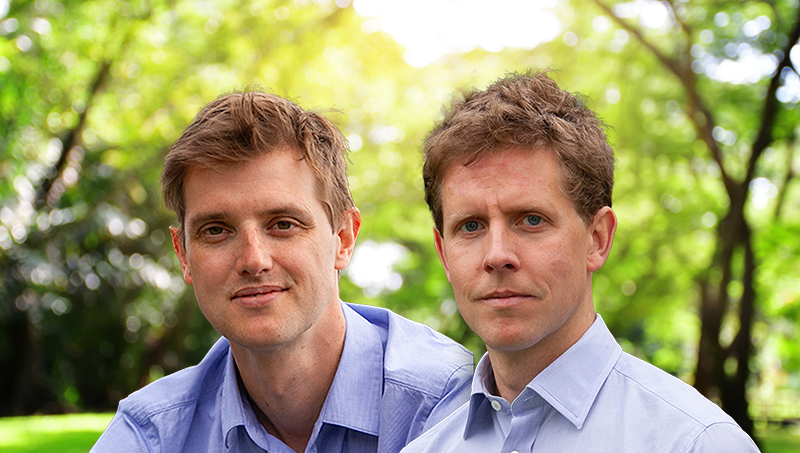Portfolio Adviser had the opportunity to quiz the managers of the £71m Evenlode Global Equity fund on their career paths, how they run the fund, why they hold some of their biggest positions and where the best opportunities in the market can be found.
Here is what they told us.
What is your career background? How did you find your way into investing and your current role?
Elliott: (pictured on the left) Like many at Evenlode, my prior experience was not in the financial services industry. After graduating from Cambridge University with a degree in Mathematics & Economics, I became a software engineer building web-based applications. This allowed me to develop my coding and data analysis skillsets, which would later prove useful. Whilst outside of the industry, I also completed my CFA exams (in my spare time) and discovered a natural curiosity for businesses and the competitive advantages that determine their success or failure. This led me to join Evenlode in 2015, as the first analytical hire after the founders, Hugh and Ben.
Knoedler: (pictured on the right) I read English at Oxford and subsequently worked for six years at Arisaig Partners, an emerging markets investor which manages long-only equity portfolios with a strong quality focus. I then spent five years at another boutique, Independent Franchise Partners, which manages equity portfolios in developed markets and has a strategy I’d characterise as quality with a rigorous valuation overlay, before I moved to Evenlode in 2020. Evenlode was a very logical fit given my career had been deeply focused on bottom-up analysis creating concentrated portfolios of ‘quality’ companies, anchored on a solid valuation discipline.
What is the broad strategy you have in place for the fund?
Elliott : All Evenlode funds share a single, long-term philosophy. We see equity investments as fractional stakes in real businesses, not just paper shares to be traded. As such, we focus on businesses with durable competitive advantages, which reinvest for growth and carefully manage their idiosyncratic risks. These companies can sustain high returns on invested capital (ROIC) and steadily compound cash flow, the driver of long-term investor returns. Relative to our income funds, the Evenlode Global Equity fund concentrates on business that have higher levels of reinvestment, providing higher cash flow compounding. However, we share the same valuation and risk discipline, aiming to ensure a smooth ride for our co-investors.
Which industries and sectors offer the most compelling opportunities at the moment in your view?
Knoedler: We don’t invest thematically and approach all companies from the bottom up. That said, our focus on stable and persistent cash ROIC means in practice that we operate in a limited group of sectors, and Evenlode funds have a bias towards areas like consumer staples, healthcare, consumer discretionary, and technology. Our focus on long-term sustainable ROIC means we prefer companies with room to compound based on substantial unmet customer need, which is a common thread which runs through our holdings, e.g. in consumer payments, corporate risk brokerage, and the application of advanced computing to corporate IT missions.
You recently talked about the impact of the growth of AI and machine learning on some of your holdings. What are the biggest opportunities in this area, and risks?
Elliott: The recent publicity around artificial intelligence (AI) and, more specifically, large language models (LLMs) has been fascinating. We’ve spoken to experts in the field and have experimented directly ourselves to learn more. The integration of AI in productivity tools should improve user efficiency for software vendors and will create new revenue streams. However, the main beneficiaries appear to be the large cloud vendors that will meet AI’s demand for massive workloads. We are more cautious about the prospect of AI driving rapid disruption in the search market, as there are powerful proprietary data assets which drive consumer experience.
Could you give three examples of your largest holdings and lay out the main reasons you hold them?
Elliott: Microsoft is the dominant global provider of productivity software, and additionally has a powerful position in enterprise cloud. The transition to cloud is still young, with only 30% of workloads migrated so far. We believe the cloud investments made today will have attractive returns, as Microsoft’s cloud business develops similar integration into client operations as the traditional OS and Office franchises.
Mastercard’s global payments network enjoys powerful network effects, and has become progressively more ubiquitous and sophisticated. Switching costs are high, as substitution of this requires not only new technology, but changes in consumer behaviour and a complete rewrite of the rules of engagement for banks. As such, we expect the card networks to retain their attractive economics.
Wolters Kluwer sells data and software to professionals, including lawyers, doctors, and accountants. The software is only a small proportion of a client’s cost base but is integral to the quality of service they offer. As Wolters transitions products to the cloud, increased visibility on client workflows will enable more tailored add-on products with low incremental costs to serve.
What is your overall outlook for the global economy over the next one to two years, and how does this impact your plans for the fund?
Knoedler: Evenlode does not invest using a macroeconomic overlay – we are deliberately agnostic about future economic trends. A company blessed with a competitive advantage which confers pricing power, and hence a good cash return on capital, makes its own weather to a much greater extent than the median listed company. While we are mindful of numerous macro warning signs, we also believe that timing markets is a low-percentage game, and not one we are skilful at; we prefer rather to own competitively advantaged companies at a supportive valuation at all times.







